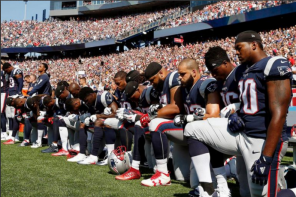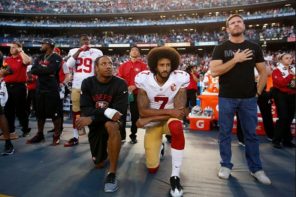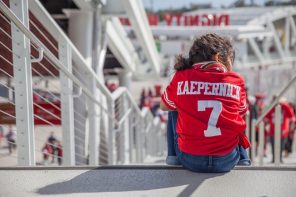Did you catch the 14th Annual Official NFL Super Bowl Gospel Celebration on the Friday before Super Bowl XLVII? Yeah, me neither.
In fact, I’m a little embarrassed to admit that despite having spent the better part of my adult life studying and writing about gospel (albeit the Southern white variety rather than the more familiar black gospel tradition featured at the Super Bowl event), I had never heard of this “faith and football” celebration before the good folks over at Queerty rounded up a rogue’s gallery of homophobic and anti-gay comments by several of the concert’s headliners, including Donnie McClurkin, Kirk Franklin, and Marvin Winans.
To gospel insiders, this culturally regressive state of affairs is not at all surprising. At least, I probably wouldn’t have paid much attention to the Super Bowl Gospel Celebration this year if it hadn’t occurred just days after the disjointedly homophobic comments by San Francisco 49ers’ cornerback Chris Culliver about “the gay guys” in the NFL. His full remarks are here, but in short, Culliver let it be known that “I don’t do the gay guys, man,” and besides, there are no gay 49ers, according to Culliver, and they should leave if there are any, anyway.
It’s a sign of the age of cultural enlightenment that seems to be dawning in the NFL that Culliver’s remarks were swiftly and roundly rejected by both the 49ers front office and a raft of players, including the NFL’s straight-but-not-narrow ambassadors of loud-and-proud support for gay rights, the Baltimore Ravens’ Brendon Ayanbadejo and the Minnesota Vikings’ Chris Kluwe.
Here’s what’s striking about the juxtaposition of these events—Culliver and the collective response to his comments on the one hand, and on the other, the NFL’s longstanding relationship to the leading lights of dark-age thinking about sexuality in gospel music. For perhaps the first time in the 14-year history of the Super Bowl Gospel Celebration, there is a real reason to note meaningful discontinuities between the dominant views on homosexuality of the gospel concert’s headliners, and prevailing attitudes toward non-heterosexuality at the leading edge of NFL culture.
It’s probably too much to call the NFL open and affirming (there are still no openly gay NFL players in the game today), but the media-savvy gay-friendliness demonstrated by Kluwe and Ayanbadejo really does suggest that a powerful shift is underway in the norms and mores surrounding homosexuality in pro football.
One reason that comments from just a few guys can make such a disproportionate impact here is that for years now, the holy trinity of American professional athletics—football, baseball, and basketball—has seemed largely impervious to the broader movement toward gay and lesbian acceptance in most other sectors of mainstream culture (not for nothing did Kluwe participate in an October radio panel titled “The Gay Jackie Robinson”—as in, professional sports needs one).
This imperviousness to progress has seemed most intense in the NFL. The undisputed corporate colossus of professional sports, the league mints money on the religious devotion of fans to their teams. And that devotion is fed by the media-crazed manufacture of celebrity player-brands who embody a cartoonishly outsized machismo built on the (until very recently, at least) untroubled assumption that the real men of the NFL… well, they “don’t do the gay guys, man.”
In one sense, then, it hardly seems surprising that the NFL should have a history of making common cause with the largely unliberated world of gospel music. The history of modern gospel is defined, as recent books by both Anthony Heilbut and myself have variously shown, by the contributions of non-heterosexuals. Their influence has infused the music with a definitively queer sense and sensibility, and without queer voices and talent it would hardly be possible for gospel to be said to exist at all.
And yet, the gospel church of Martin Luther King and James Baldwin and Bayard Rustin has been transformed over the past 30 years and pulled radically rightward by charismatically moralistic evangelists of a name-it-and-claim-it prosperity gospel. In today’s gospel church, as I have noted elsewhere, “these celebrity preacher-divas rely on a flamboyantly emotional style steeped in the same deeply gay sensibility that underlies gospel music, even as fierce opposition to homosexuality is the modern saint’s truest proof of piety.”
And the NFL? Without excusing Culliver’s crudities, it’s nevertheless possible to at least understand where the virulence of his attitudes on homosexuality comes from. Here’s a kid whose life has been defined by a cultural citadel of such histrionically straight masculinity that one player slapping another man’s spandexed ass on prime-time television is something close to the universal sign of “no-homo.” In this context, one might feel the need now and then to remind oneself and the world that one “can’t be with that sweet stuff,” as Culliver put it.
Both the NFL and gospel music, then, might be said to have long relied on flamboyantly fraught caricatures of gender and sexuality, and both football and gospel are as often assumed to be keepers of traditional values surrounding masculinity and piety as they are deeply indebted to decidedly homoerotic and queer energies.
Right now, it seems, the biggest difference between the two is how a new generation of celebrities (and their fans) in each world has chosen to respond to this reality.
After McClurkin, a popular gospel preacher and singer, acknowledged homosexual attractions and experiences, he sought refuge in the ex-gay world of reparative therapy and subsequently used a sermon to compare gay men to vampires (McClurkin’s testimony credits fellow headliner at the Gospel Celebration, Marvin Winans, for providing McClurkin with strong, straight male friendships: “being in a sea of men in Detroit helped give Donnie a new sexual identity”).
Meanwhile, Kluwe and Ayanbadejo have used their celebrity to make a plainspoken, unpretentiously eloquent case for gay rights and equality under the law. Thus Kluwe on what he’s up to: “I strongly believe that goodness is contagious and that others will jump on board as the younger generation begins to populate the NFL.”
It’s always been true that strategically applied pressure can destabilize entrenched attitudes and beliefs and create space for new norms and liberated possibilities (thanks again, Joe Biden). But who knew it would turn out that the NFL has a thing or two to teach the gospel church—born of, but these days largely in flight from, the legacy of King and Rustin and Baldwin—about love, acceptance, and the struggle to overcome in a world of injustice?




